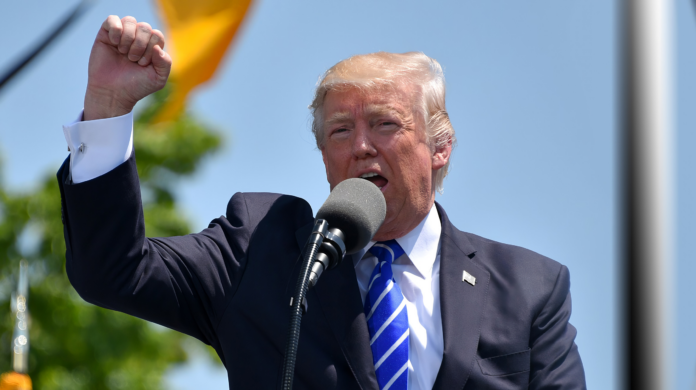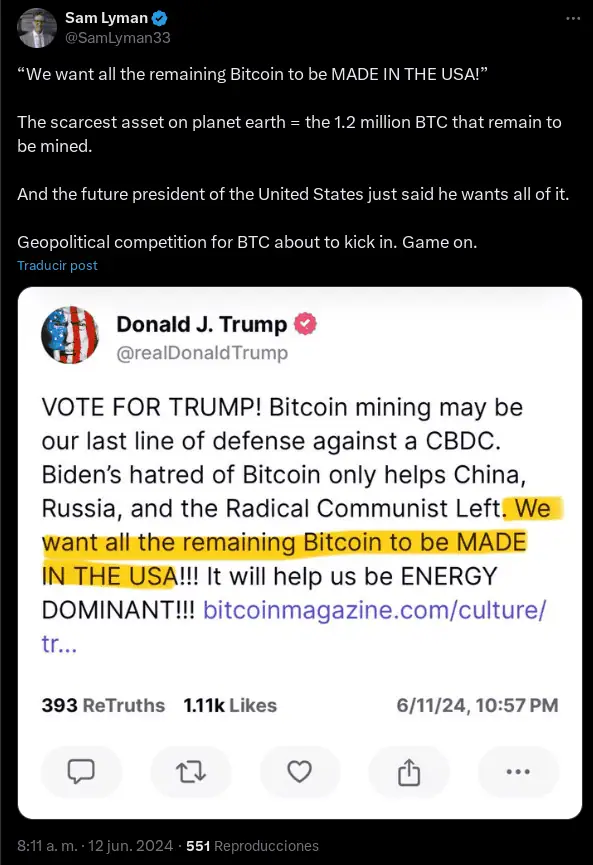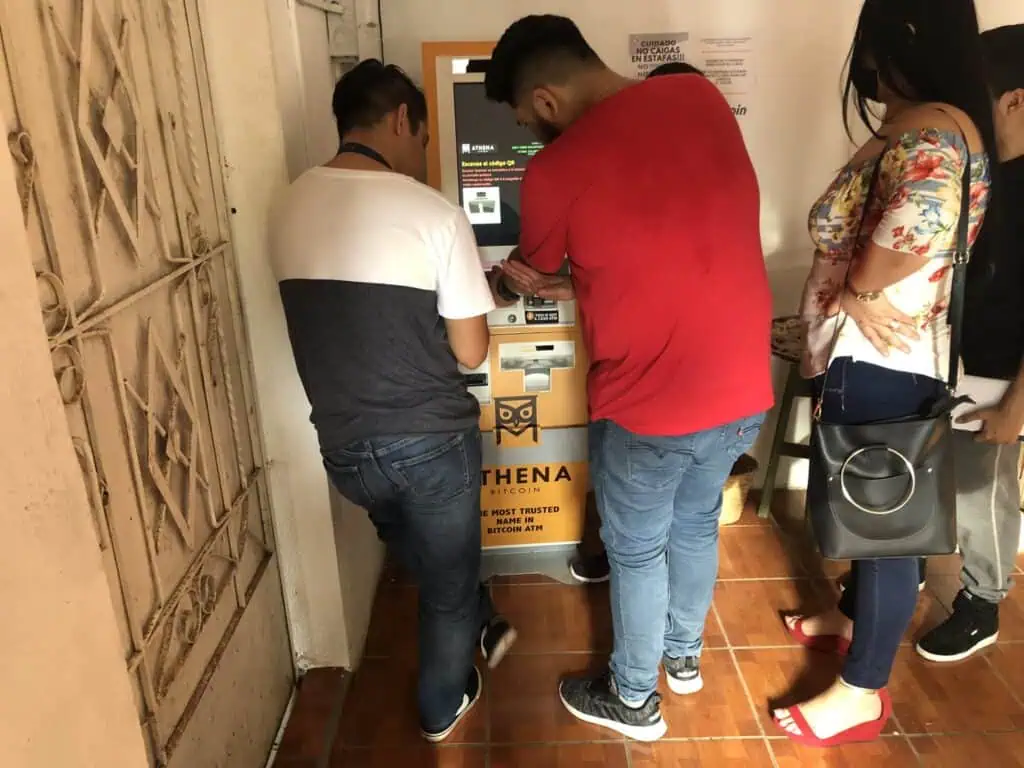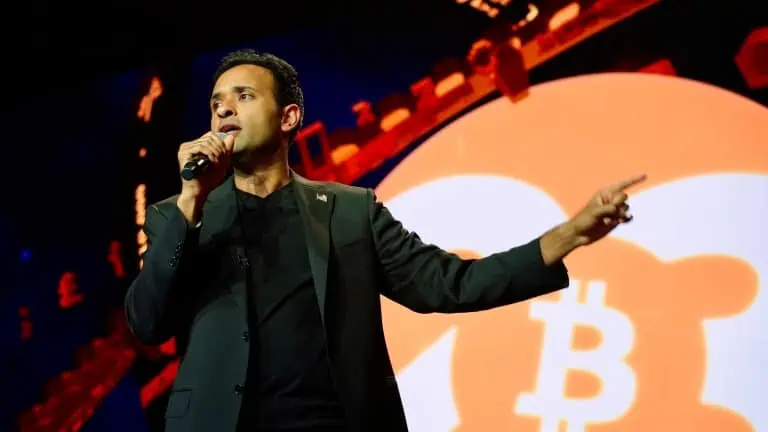
Donald Trump sees Bitcoin as a unique opportunity for the United States to initiate what is known as "crypto diplomacy," promoting projects and infrastructure to encourage the adoption and development of these technologies, both public and private.
In a surprising turn in the US political and economic landscape, former President (and Republican candidate again) Donald Trump has sparked an intense debate by proposing the adoption of Bitcoin as a strategic reserve asset for the country. This bold proposal, which is shaping up to be one of the stars of his new government plan, has captured the attention of both cryptocurrency enthusiasts and economic policy experts.
In a post from his account on the social network Truth Social, Donald Trump made very clear his vision on Bitcoin and the role that the United States has to play within the development of the ecosystem, something that Sam Lynman (Director of Public Policy at Riot Platforms and contributing writer for Forbes) echoes on his X account and in Forbes.

Donald Trump and Bitcoin as a geopolitical tool
Donald Trump, known for his controversial stances, has expressed strong support for Bitcoin in recent statements. The former president acknowledges the geopolitical importance of the world's largest cryptocurrency, warning that any policy that seeks to hinder Bitcoin "it only helps China and Russia."
This stance not only positions Trump as the first pro-Bitcoin candidate from a major political party, but also puts the spotlight on discussions about Bitcoin’s classification as a strategic reserve asset.
Trump believes it is crucial to develop Bitcoin and its associated technologies for several reasons:
- Technological competitiveness: Maintaining a leading position in financial innovation in the face of powers such as China and Russia.
- Financial Independence: Reduce dependence on the traditional financial system controlled by third parties.
- Inflation protection: Using Bitcoin as a deflationary asset to counteract dollar inflation.
- Global leadership: Position the United States as a leader in cryptocurrency adoption and regulation.
The importance of positive regulation
A key part of Trump's proposal is the development of a positive regulatory framework for cryptocurrencies in the United States. The former president understands that favorable regulation is essential to foster innovation and growth of the crypto ecosystem in the country. This would include:
- Legal clarity: Establish clear definitions regarding the legal status of different cryptocurrencies.
- Tax incentives: Implement fiscal policies that encourage investment and development in the crypto sector.
- Consumer protection: Create regulations that protect investors without stifling innovation.
- Public Private Partnerships: Promote cooperation between government and industry to develop standards and best practices.
- Education: Promote educational programs on cryptocurrencies and blockchain technology for the general public.
Trump argues that positive regulation would not only benefit the crypto sector, but would also attract foreign investment, create high-quality jobs and strengthen the United States' position as a leader in financial innovation.
Following the path of others: the case of El Salvador
And if we look at what is happening in the crypto sector in general terms, Donald Trump is not far from reality. Firstly, the "catastrophe" of accepting cryptocurrencies as part of the strategic assets of a nation so predicted by the IMF and the World Bank, has been silenced by a clear example: El Salvador.

The Central American country has Bitcoin as part of its strategic reserves. In addition, it has very clear policies regarding the legal use of cryptocurrency in its territory. Result? El Salvador currently has 5800 BTC in its possession, worth approximately $341 million. In fact, has launched a website where the holdings and addresses where this Bitcoin is being held can be tracked, in a clear exercise of transparency regarding said holdings. A far cry from the catastrophic predictions of the IMF and the World Bank regarding this strategy.
A similar situation is experienced in countries such as Venezuela and Argentina, where the use of cryptocurrencies has alleviated the hyperinflationary pressures of their economies and stabilized them to a bearable point, where their citizens can breathe in economic and financial terms.
Singapore case
But perhaps the best example of Donald Trump's vision of Bitcoin can be seen in Singapore. This country, considered one of the most important economic and financial hubs in Asia and the world, is currently implementing an ambitious plan to unite the traditional financial world and the crypto world: Project Guardian.
And this is no small feat, as we are talking about a project that already brings together more than 40 entities, including Central Banks, Monetary Authorities and private banks. Names such as the Financial Conduct Authority (United Kingdom), Financial Services Agency (Japan), International Monetary Fund, Swiss Financial Market Supervisory Authority, Banque de France, BNY Mellon, JP Morgan Chase, Moody's, S&P Global, Citi, DBS, Deutsche Bank, Euroclear, Franklin Templeton, Hongkong and Shanghai Banking Corporation, Standard Chartered, UBS Group and the United Overseas Bank Limited are resonant.
All of them are globally recognized names of enormous importance, but the main institutions of the United States are not there. Neither the SEC, nor the FDIC, nor the CFTC. Nothing, the US government is not at the party. Completely displaced by a country, which could well be an American city, due to its size, but which in recent years is becoming an important center of financial development and which has a clear vision: cryptocurrencies are here to stay.
Crypto Diplomacy
Faced with this situation, Trump is seeking to do what many in the community are already calling “crypto diplomacy.” In short, start leading international initiatives to establish global standards in the regulation, use of cryptocurrencies and generation of infrastructures for public and private cryptocurrencies.
And Trump makes this very clear in his message on Truth Social: if we want to be at the forefront of crypto, we need to invest in the infrastructure necessary to support a cryptocurrency-based economy, including improvements to the power grid and the Internet, as well as funding R&D programs at universities and national laboratories focused on blockchain technology and cryptocurrencies.
In this way, it would gain strength and prestige in that sector, and it would also serve to give the dollar a new point of support using Bitcoin. In fact, this is a possibility that follows the line of similar proposals by other politicians such as Vivek Ramaswamy and Robert F. Kennedy Jr.

Another relevant voice in the ecosystem that has also echoed this "crypto diplomacy" is the well-known bitcoiner Max Keiser, who since 2019, has spoken about what he calls: "Global Hash War", a proxy war where large countries will fight for the best strategy to control the crypto ecosystem, the economies and finances that are built on them.
A paradigm shift
Donald Trump's proposal to consider Bitcoin as a strategic reserve asset thus represents a paradigm shift in the United States' economic and technological policy. While it faces significant challenges, it also offers unique opportunities for the country to maintain its leadership in the digital age.
Implementing this vision would require a careful and balanced approach, considering both the potential benefits and the associated risks. However, if executed successfully, it could redefine the United States’ role in the 21st-century global economy and secure its position as a leader in the digital finance revolution.
Ultimately, Trump’s proposal has opened up a crucial debate about the future of global finance and the role of cryptocurrencies in national economic strategy. Regardless of the outcome of the 2024 election, these conversations are likely to continue to shape U.S. economic and technology policy for years to come.
The adoption of Bitcoin as a strategic reserve asset by the United States would be a bold and transformative step that could have far-reaching ramifications on the global economy and geopolitics. As the world watches intently, the debate over Bitcoin’s role in U.S. national strategy promises to be one of the most fascinating and consequential topics in the years ahead.



